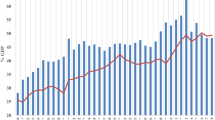Abstract
This study aims to investigate political budget cycles motivated by elections in Indonesia and the role of incumbent coalition parties in the degree of budget manipulation in election years. Employing a panel data regression model, we analyzed total revenue and total expenditures, together with their components, to identify budget patterns. The study employed data obtained from 499 districts/cities in Indonesia, covering the 2011–2017 period. With regard to revenue, budget cycles existed in all components of local own revenue. In contrast, they occurred in spending components favorable for community welfare in terms of the spending function. In relation to the type of spending, budget cycles were evident in spending components, goods and services spending, and capital spending. Stronger incumbent party alliances were observed to lead to a higher degree of budget manipulation in election years.

Similar content being viewed by others
References
Arellano M, Bond S (1991) Some tests of specification for panel data: Monte Carlo evidence and an application to employment equations. Rev Econ Stud 58:277–297
Balassone F, Giordano F (2001) Budget deficits and coalition governments. Public Choice 106:327–349
Blais A, Kim J, Foucault M (2010) Public spending, public deficits and government coalitions. Political Studies 58:829–846
Block SA, Ferree KE, Singh S (2003) Multiparty competition, founding election, and political business cycle in Africa. J Afr Econ 12:408–444
Blundell R, Bond S (1998) Initial conditions and moment restrictions in dynamic panel data models. J Econometrics 97:115–143
Brender A, Drazen A (2008) How do budget deficits and economic growth affect reelection prospects? Evidence from a large cross-section of countries. Am Econ Rev 98:2203–2220
Chortareas G, Logosthetis V, Papandreous A (2016) Political budget cycles and reelection prospects in Greece’s municipalities. Eur J Polit Econ 43:1–13
Drazen A, Eslava M (2010) Electoral manipulation via voter-friendly spending: theory and evidence. J Dev Econ 92:39–52
Efthyvoulou G (2012) Political budget cycles in the European Union and the impact of political pressures. Public Choice 153:295–327
Germann S (2017) Political budget cycles and fiscally conservative voters. Econ Lett 155:72–75
Hessami Z (2014) Political corruption, public procurement, and budget composition: Theory and evidence from OECD countries. Eur J Polit Econ 34:372–389
Hidayat S (2009) Pilkada, Money politics and the dangers of “Informal Governance” practices. In: Erb M, Sulistiyanto P (eds) Deepening democracy in Indonesia? Direct election for local leaders (Pilkada). ISEAS Publishing, PasirPanjang, pp 125–146
Katsimi M, Sarantides V (2012) Do elections establish democracies? Public Choice 151:352–362
Klomp J, Haan J (2013) Political budget cycle and election outcomes. Public Choice 157:245–267
Lewis BD, Hendrawan A (2018) The impact of majority coalitions on local government spending, service delivery, and corruption in Indonesia. Eur J Polit Econ 58:178–191
Meza OD (2015) Local governments, democracy, and inequality: evidence on the political economy of inequality-reducing policies in local government in Mexico. SLGR 47:285–296
Mink M, de Haan J (2006) Are there political budget cycles in the Euro area? European Union Politics 7:191–211
Nordhaus W (1975) The political business cycle. Rev Econ Stud 42:169–190
Priyono SH (2017) Political budget cycles and the indonesian simultaneous regional direct elections in 2015. JurnalPerencanaan Pembangunan. https://doi.org/10.36574/jpp.v2i3.38
Rahman R (2018) Pendapatan Daerah danSiklusPolitikKabupaten/Kota di Indonesia [Local government revenue and political cycles at district/municipality level in Indonesia]. Jurnal EKOBISTEK FakultasEkonomi 7:59–67
Rogoff K (1990) Equilibrium political business cycles. Am Econ Rev 80:21–36
Rubin IS (2010) The politics of public budgeting, 6th edn. CQ Press, Washington
Setiawan D, Rizkiah F (2017) Political budget cycles in municipalities: evidence from Indonesia. IntJ BusSoc 18:533–546
Shi M, Svensson J (2006) Political budget cycles: Do they differ across countries and why? J Public Econ 90:1367–1389
Sjahrir BS, Kis-Katos K, Schulze GG (2013) Political budget cycles in Indonesia at the district level. Economics Letters 120:342–345
Tujula M, Wolswijk G (2007) Budget balances in OECD countries: What makes them change? Empirica 34:1–14
Veiga LG, Veiga FJ (2007) Political business cycles at the municipal level. Public Choice 131:45–64
Vergne A (2009) Democracy, election, and allocation of public spending in developing countries. Eur J Polit Econ 25:63–77
Acknowledgements
The authors are grateful for the support of 2019 PITMA Grant-Universitas Indonesia and to the anonymous reviewer(s) for their useful suggestions.
Author information
Authors and Affiliations
Corresponding author
Ethics declarations
Conflict of interest
The authors declare that they have no conflict of interest.
Additional information
Publisher's Note
Springer Nature remains neutral with regard to jurisdictional claims in published maps and institutional affiliations.
Appendix
About this article
Cite this article
Wiguna, G.E., Khoirunurrofik, K. Political budget cycle patterns and the role of coalition parties in shaping Indonesian local government spending. Asia-Pac J Reg Sci 5, 41–64 (2021). https://doi.org/10.1007/s41685-020-00186-0
Received:
Accepted:
Published:
Issue Date:
DOI: https://doi.org/10.1007/s41685-020-00186-0




